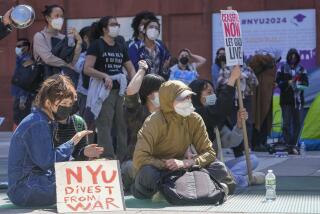Zaire Continues Spiral Into Chaos
The United States on Wednesday called for order and concrete steps toward democracy in Zaire, but the Clinton administration’s entreaties went unheeded as the large Central African country cascaded further into bloody chaos.
Even as the White House and State Department urged the swift signing of a cease-fire agreement, rebel troops marched into the country’s second-largest city, and in the streets of Kinshasa, the capital, thousands of followers of a different opposition faction battled soldiers loyal to ailing President Mobutu Sese Seko.
Rebel leader Laurent Kabila, whose troops on Wednesday captured all but the airport of the strategic city of Lubumbashi, called early today for a halt in the fighting to allow Mobutu to quit.
Kabila stressed that the “pause” was not a cease-fire but a slowdown in military operations and said he was optimistic Mobutu would show willingness to negotiate his departure within three days.
“I am waiting for a little period of three days for Mobutu to make a decision to contact us to negotiate his departure,” Kabila said at Mobutu’s former palace in Goma, now used as rebel headquarters.
There was little doubt that the U.S. wants the 66-year-old Mobutu out of the way as soon as possible. “Mobutuism is about to become a creature of history,” said White House Press Secretary Mike McCurry, “because the support for President Mobutu is not sufficient to lead Zaire into the next chapter of its history.”
McCurry denied that the administration had asked Mobutu to step down. “We have not suggested that Mr. Mobutu should resign or should go into exile,” he said. “That is in fact for the people of Zaire to decide. But we have suggested that the era of Mobutuism in Zaire is over, because the status quo is no longer tenable, given the dire conditions that exist for the people of Zaire.”
It is not clear whether the United States has enough leverage to change the course of events in Zaire. Nevertheless, the official U.S. rhetoric came in torrents, with State Department spokesman Nicholas Burns saying: “The government of President Mobutu, as well as the rebels themselves, must recognize [that] the status quo cannot be maintained in Zaire.”
The most chaotic scenes Wednesday reportedly took place in Kinshasa, where soldiers seized Prime Minister Etienne Tshisekedi as he led more than 10,000 of his followers in a protest march against Mobutu. Tshisekedi’s political strength comes from the fervor of his followers in the enormous slums of the city of 5 million people.
Mobutu had appointed Tshisekedi, a longtime opposition leader, only last week in hopes of calming the turmoil. But, after the protest march, he fired Tshisekedi and replaced him with Gen. Likulia Bolongo, the minister of defense.
Tshisekedi, who tried to enter his office, was taken home by the soldiers. “Mr. Tshisekedi was brought to his home for his own safety,” a Ministry of Defense spokesman told Associated Press. “He is not under house arrest.”
Troops, some of them led by Gen. Mobutu Kongulu, the president’s son, used tear gas to disperse the protesters. But a Tshisekedi aide vowed that his party would continue the protests. “We are living through the last acts of a decadent regime about to fall,” Jean-Pierre Cimanga, vice president of the party, told AP.
Meanwhile, Kabila’s rebel forces entered Lubumbashi, the biggest prize in their six-month campaign to topple Mobutu.
Lubumbashi is the center of Zaire’s once-thriving copper-mining industry. When known as Elisabethville more than 30 years ago, it was the capital of the secessionist province of Katanga. United Nations troops, supported diplomatically by the United States, put down that rebellion in the early 1960s.
Residents of the city of 1 million hailed the rebels’ arrival, according to Reuters news agency. Mobutu loyalists put up some resistance, but as the rebels pressed on to the city center, troops of the Zairian army were nowhere in sight. They evidently had retreated so quickly that they had no time to loot homes and shops, a trademark of the Zairian army since independence in 1960.
With the capture of Lubumbashi, the rebels control all the major cities of Zaire except Kinshasa. It is unclear if they have the personnel or skills to administer the territory between these urban centers.
In Washington, Burns did not hide his annoyance at Kabila for refusing last week to allow the U.N. to fly into Kisangani and evacuate tens of thousands of Rwandan Hutu refugees, who reportedly have been dying at a rate of 120 a day. Kabila finally gave his permission over the weekend, Burns said, but “the Rwandan government is now dithering and delaying in giving the necessary permission to allow these refugees to be returned to Rwanda.” Kabila’s reputation was further sullied by a U.N. report that accused his soldiers of committing mass murders, especially of Hutu refugees.
The official, Robert Garreton, reported to the U.N. Commission on Human Rights that his investigation verified the murder of 500 people at a refugee camp in Chimanga in February and the death of at least 140 at the refugee camp in Katale.
More to Read
Start your day right
Sign up for Essential California for news, features and recommendations from the L.A. Times and beyond in your inbox six days a week.
You may occasionally receive promotional content from the Los Angeles Times.






